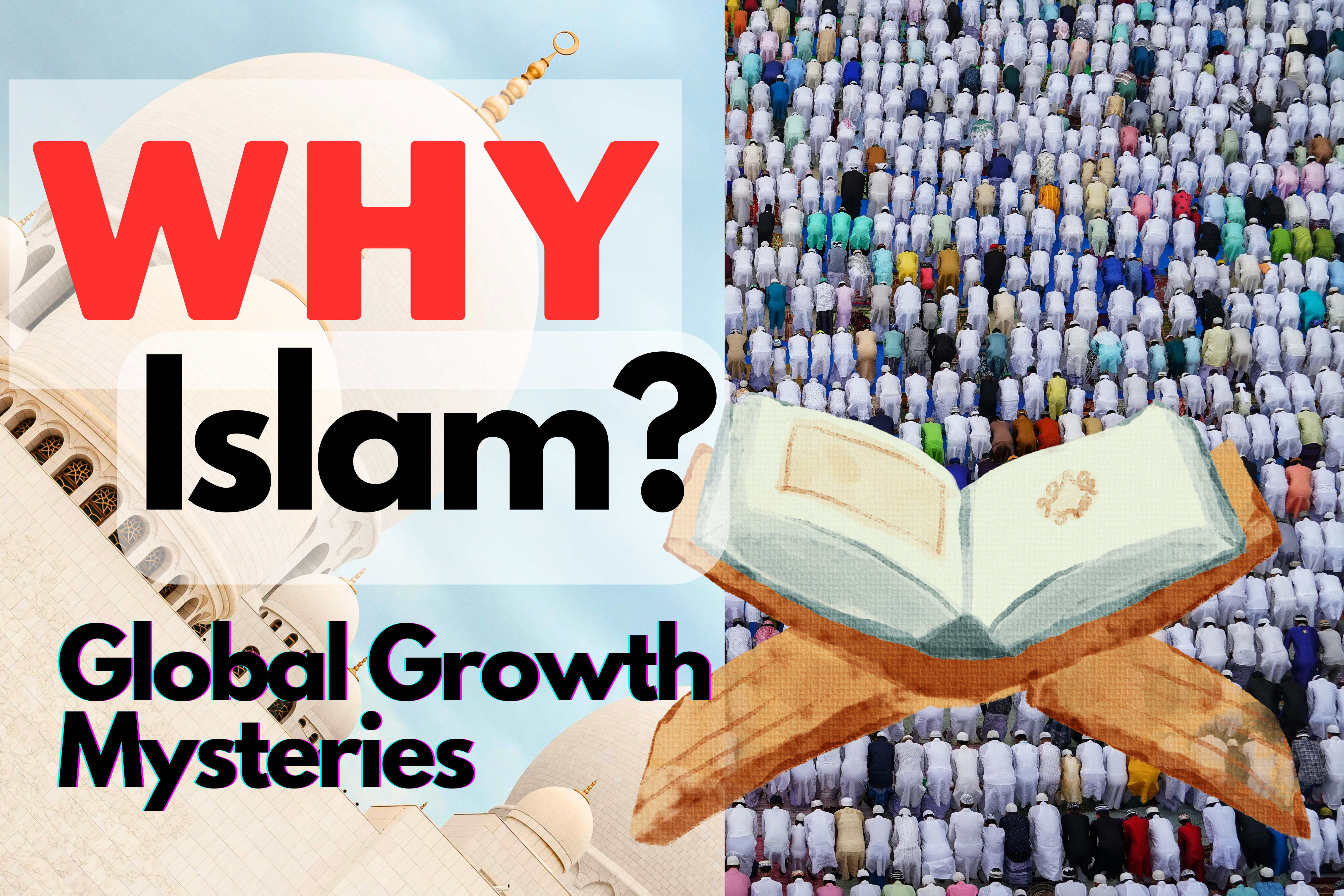![]()
Understanding the Rapid Growth of Islam: Factors Contributing to Its Expansion.
People admire and embrace Islam because it is considered to be a straightforward and genuine religion like no other. Its essence is spreading rapidly across the globe. Islam, the world’s second-largest religion, has experienced remarkable growth in recent decades, attracting millions of followers across the globe.
This phenomenon begs the question: why is Islam expanding at such a rapid pace? Several factors contribute to the widespread adoption and growth of Islam, ranging from demographic trends to social and cultural influences.
Why is Islam the fastest growing religion in the world?
Unveiling the Phenomenon: Why Islam is the Fastest Growing Religion Worldwide
In today’s dynamic global landscape, the growth and spread of religions captivate the attention of scholars, sociologists, and the general public alike. Among the various faiths, Islam stands out for its remarkable expansion, emerging as the fastest-growing religion across continents. Delving into the intricacies of this phenomenon unveils a multifaceted narrative, intertwining historical, cultural, and socio-political elements. Let us embark on an insightful journey to comprehend the factors driving the exponential growth of Islam worldwide.
Historical Foundations: Tracing the Roots of Islamic Expansion
Islam’s origins can be traced back to the early 7th century CE when Prophet Muhammad received revelations from Allah in Mecca. These revelations, compiled into the Quran, established a monotheistic faith emphasizing God’s will. The spread of Islam was not just a religious movement but also a socio-political revolution, providing a unified governance and societal organization framework.
The Golden Age of Islam: Catalyst for Expansion
Sociocultural Influences: Understanding Modern-Day Dynamics
Demographic Trends: Exploring Population Dynamics
The demographic landscape plays a pivotal role in shaping the trajectory of religious growth. Islam’s expansion is buoyed by high birth rates among Muslim populations, particularly in regions such as Africa, South Asia, and Southeast Asia. Additionally, factors such as conversions, migration patterns, and religious outreach initiatives contribute to the steady rise of Islam on a global scale.
Cultural Relevance: Appealing to Diverse Audiences
Islam’s adaptability and inclusivity resonate with individuals from diverse cultural backgrounds, fostering a sense of belonging and identity. The universality of Islamic teachings, coupled with a rich tapestry of traditions and rituals, transcends geographical boundaries, attracting followers across continents. Moreover, the emergence of social media platforms and digital communication channels has facilitated greater connectivity among Muslims worldwide, fostering community cohesion and solidarity.
| For more information: Islam – Wikipedia |
Contemporary Dynamics: Navigating the Complexities of Modernity
Globalization and Connectivity: Bridging Distances
In an increasingly interconnected world, globalization serves as a conduit for the diffusion of religious ideas and practices. The proliferation of digital media platforms enables Muslims to engage in virtual communities, share religious knowledge, and participate in online religious discourse. Moreover, the ease of travel and migration facilitates the spread of Islam to new frontiers, fostering cultural exchange and cross-cultural interactions.
The appeal of Islam extends beyond spiritual fulfillment, encompassing practical solutions to socio-economic challenges faced by individuals and communities. Islamic principles of social justice, charity (zakat), and community welfare resonate with individuals seeking meaning and purpose in their lives. Furthermore, initiatives such as Islamic banking and finance offer ethical alternatives to conventional financial systems, attracting interest from both Muslims and non-Muslims alike.
Why Do Famous Hollywood Celebrities and Business Tycoons Embrace Islam?
List of Famous People Who Accepted Islam
Numerous prominent figures from Hollywood and the business world have found solace and inspiration in Islam, drawn by its profound teachings and universal values. Every month, thousands of individuals convert to Islam across different countries. Here’s a list of some famous converts to Islam.
Muhammad Ali
Born on January 17, 1942, in Louisville, Kentucky, Muhammad Ali was a legendary heavyweight boxer and cultural icon. He converted to Islam in 1964, marking a monumental moment in his life’s journey.
Craig Hodges
Born on June 27, 1960, Craig Hodges is a former professional basketball player known for his sharpshooting skills. He later became an activist, addressing social justice issues and advocating for athletes’ rights. Hodges, who embraced Islam, refused to stand for the U.S. national anthem, stating Islam’s opposition to oppression.
Mike Tyson
Born on June 30, 1966, in Brooklyn, New York, Mike Tyson is a former professional boxer and iconic figure in the history of the sport. Known for his ferocious fighting style and undisputed heavyweight championships, Tyson became the youngest heavyweight champion at the age of 20. Beyond boxing, he ventured into acting, business, and philanthropy, converting to Islam in the 1990s, adopting the name Malik Abdul Aziz.
Jennifer Grout
Born on October 12, 1991, Jennifer Grout is an American singer known for her impressive vocal talent. Despite not being of Arab descent, Grout gained international recognition for her participation in the Arabic singing competition “Arabs Got Talent.” She converted to Islam after marrying her Moroccan husband in 2013, following his footsteps in embracing the faith.
Thomas Abercrombie
Born on July 5, 1987, in Auckland, New Zealand, Thomas Abercrombie is a professional basketball player renowned for his remarkable skills on the court. He has been a key player for the New Zealand Breakers in the Australian National Basketball League (NBL) and a significant contributor to the success of the New Zealand national basketball team, the Tall Blacks.
Jermaine Jackson
Born on December 11, 1954, Jermaine Jackson is an American singer, songwriter, and bass guitarist. He gained early fame as a member of the Jackson 5 alongside his siblings, including Michael Jackson. Jermaine converted to Islam in 1989, expressing belief that his brother Michael might have been alive if he had also converted.
Dave Chappelle
O’Shea Jackson (Ice Cube)
Born on June 15, 1969, O’Shea Jackson, professionally known as Ice Cube, is an American rapper, actor, and filmmaker. He gained fame as a member of the pioneering rap group N.W.A and later pursued a successful solo career. Ice Cube converted to Islam in the 1990s, describing himself as a “natural Muslim” in his connection with God.
Kareem Abdul Jabbar
Born on April 16, 1947, Kareem Abdul-Jabbar is a retired American basketball player widely regarded as one of the greatest in NBA history. Standing at 7 feet 2 inches, he dominated the court during his career, primarily with the Milwaukee Bucks and the Los Angeles Lakers. In 1968, Abdul Jabbar embraced Sunni Islam, adopting his Arabic name in 1971.
Shaquille O’Neal
Born on March 6, 1972, Shaquille O’Neal is a retired professional basketball player and one of the most dominant centers in NBA history. Known for his imposing physical presence, O’Neal played for several NBA teams during his illustrious career, winning multiple championships. Raised in a household with a Christian mother and a stepfather practicing Islam, O’Neal referred to fellow NBA player Hakeem Olajuwon as a “Muslim brother” in 2008.
Jemima Khan
Born on January 30, 1974, in London, Jemima Marcelle Goldsmith is a British journalist, activist, and documentary producer. Raised in a Jewish household, she converted to Islam upon marrying Pakistani cricketer Imran Khan in 1995. Despite their divorce in 2004, the union produced two sons. Recognized for her philanthropic endeavors, notably with UNICEF, and her role as associate editor of the New Statesman magazine, Jemima Khan remains an influential figure in bridging cultural gaps each with their unique journey towards embracing the faith.
In conclusion
the reasons behind the embrace of Islam by famous Hollywood celebrities and business tycoons are as diverse as the individuals themselves. Whether seeking spiritual enlightenment, social responsibility, or intellectual fulfillment, Islam provides a pathway towards personal growth and a deeper understanding of the world.
Conclusion: Navigating the Path Forward
The rapid expansion of Islam is a result of historical legacies, sociocultural dynamics, and contemporary realities. Its resilience and adaptability make it a significant force in the global religious landscape. Understanding its multifaceted nature can help navigate modernity, foster interfaith dialogue, and promote mutual understanding.
What is the beauty of Islam?
Understanding and expressing the beauty of Islam is a deep subject.
1.Dedication and dedication.
A unique beauty of Islam is that it encourages the spirit of complete submission with love. Belief in Allah and renunciation of all deeds done against Him is an integral part of the values of Islam.
Peace and Consensus:
The importance of peace and harmony is considered to be the highest in Islam. This religion encourages the inspiration of unity, equality, and equity and introduces world peace through social consensus.
Education and knowledge:
Another outstanding feature of Islam is that it values knowledge and learning. Islamic scriptures contain a rich repository of unique knowledge in the fields of science, technology, and social sciences.
Empathy and service:
Sympathy and service cannot be neglected in the message of Islam. Dharma understands the importance of benevolence, charity, and service and is dedicated to the development and welfare of society.
This rich and social culture of Islam reveals its true beauty, which supports the balance of mind, body, and spirit.
Why are Europeans converting to Islam?
Search and Verification: Many Europeans study Islam and understand its values. After their righteous and spiritual quests, some people experience truthfulness and contentment in Islam and decide to convert.
2. Social Changes
Social changes and cultural shifts in Europe are making Islam more popular. Many young people are in search of self-surrender and spirituality in Islam with various social and economic changes.
Support and Communication
There are a large number of Muslim communities in Europe, which provide religious and social support to people coming to new contexts.
The Religious Conversation:
Islam is a significant religion in Europe, with its values and spiritual insights gained through social and religious discussions.
Why do Muslims believe in one God?
The reasons for this are many different religious, spiritual and social. Here, the main reasons are the principle of unity: In Islam, there is a fundamental principle of the idea of one God. In Islam, it is believed that Allah is the sole creator and preserver of all things.
Support of religious scriptures: The Quran, the principal religious text of Islam, promotes the principle of unity. In the Islamic scriptures, the importance of Allah’s oneness and faith is considered to be very high.
Motivation of exclusive devotion: In Islam there is a doctrine of exclusive devotion, which consists in the feeling of complete reverence and devotion to the same God. According to this doctrine, Allah is considered to be the only one to be worshipped.
The social message: Islam’s social message emphasizes unity in one God, promoting values of equality and justice.
You also like this post’s.
|
Israel and Palestine map |

























Add Comment